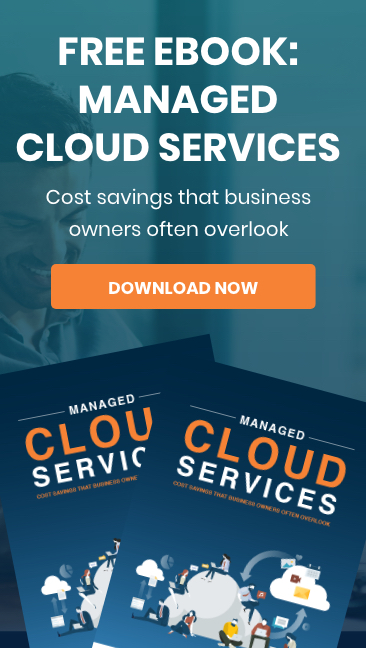Many companies understand the necessity of technology in their daily operations but often don't know what they need. They may not understand the value of the investment, only that some things work better or that they are more insulated from the threat of cybersecurity attacks in one environment compared to another.
It’s time to calculate the total economic impact and realize your IT spending's incredible return on investment (ROI).
What is the Total Economic Impact of Outsourcing your IT Support?
TEI, or Total Economic Impact, is a financial decision-making tool that has been used for several decades. The industry standard framework is well proven to model all aspects of a technical solution, the impacts that solution has on the business, and the ROI impact on products and services.
In use for over 20 years as a proven model, TEI includes four components in its evaluation of investment value: cost, flexibility, benefits, and risk. Using a method like this is helpful in making sure there are profit-centric factors behind large technology projects and initiatives. Because if you can spend money to make more of it or to allow your team to increase revenue more easily, then it becomes a common sense decision for the leadership in your organization.
Why Do Companies Outsource Their IT?
Simply put, you're in the business of doing what you do best, not becoming an expert in IT. Companies have realized that outsourcing IT results in more efficient solutions, outstanding expertise, and cost savings. You leverage an organization that provides critical services and support to many clients day in and day out. They are experts at what they do.
Outsourcing is how your business has access to just the right amount of support and the necessary expertise when needed at crucial junctures. Because your outsourced provider is dedicated only to IT support and services, your company benefits from an IT support partner with high levels of known capabilities that has worked through extensive and varied needs in the past.
The Costs of In-House IT Support
In-house support comes with the high costs of hiring IT employees, asking someone to wear multiple hats in a shared role, dealing with inconsistency, a single point of failure, and having a potentially limited knowledge base.
Employee's salaries
One of the highest costs of any company is employee salaries, including insurance benefits, employer-required payroll taxes, and vacation/sick days. An outsourced solution means you pay a fraction of the cost and get a team providing the support that is needed.
Outsourced experts also result in more efficient performance, saving your company even more.
The expense of using an outsourced IT support provider is contractual, scalable, and doesn't come with the costs of benefits and employment tax. Outsourced IT doesn't require the expenses of onboarding, HR, or training.
Recruiting cost
Finding, interviewing, and evaluating potential new hires is not cheap. As one employee leaves, that expense becomes necessary again, and outsourcing totally eliminates the need to recruit.
Cost of sick days and annual leave
Employees get sick and need vacations, which have a cost incurred while not having access to their knowledge in the event of an IT crisis or new need. An outsourced provider doesn't take a vacation and is there whenever required.
Equipment cost
Having an in-house team comes with the expense of providing them with the necessary hardware and software required to do their jobs, which can be a significant expense for your company.
Outsourced IT support providers will specify the equipment cost in their service agreement, which will be considerably lower based on what they already bring to the table and the lower prices they receive due to vendor relationships.
Additionally, in their assessment of your company's needs and how to address them, they have proven methodology and practices that will deliver more quickly and consistently over time, know what equipment is needed, and do not over-purchase, as internal teams are prone to do.
Limitations of resources and knowledge/experience
While an in-house IT department might comprise several individuals with IT experience, they can't provide the breadth of knowledge of an entire company dedicated to IT support. Having an IT department that can't respond appropriately when a new and unknown situation arises creates risk and costs time and money.
Break Fix and Reactive
In-house IT employees are often only able to react to situations that require a fix. Between daily duties, they often don't have the time or ability to anticipate potential problems and perform in a proactive model.
Your outsourced IT support partner is vested in heading off threats before they happen. Expect proactive threat assessments and solutions that save you tremendous amounts more money than reactive responses.
When Should a Growing Company Outsource Their IT?
IT is a critical component in the starting and running of any successful organization these days. Working with an IT professional or organization should be considered an important part of the equation for early and sustained success. The pitfalls and unnecessary spending that could be avoided might pay for the services provided. It should be a company goal to establish a solid technology foundation that will grow with the organization. And the fact still stands that rarely is there a time when onsite IT personnel is less expensive or more comprehensive than a professional outsourced team.
The Benefits of Outsourced IT
Do what you do and let someone else handle the IT needs. It is not your specialty. Having an outsourced IT support partner has tremendous benefits that you cannot replicate on your own.
Increased productivity
Your company's IT infrastructure is handled by a company that understands company needs and the needs of different employees. In turn, productivity increases.
A common issue with companies is that a general approach is taken to infrastructure, the needs of individual roles are not understood, and updates to role-specific software are not instituted. An outsourced provider operates with imperatives that meet each of those needs.
Increased revenue due to environmental improvements
It's a simple equation, increase operating efficiency and let people focus on the most valuable parts of their jobs, and your company's revenue grows. When redundant tasks are automated, and the IT tools upon which employees depend are improved, your company serves customers better and increases sales while reducing operating expenses.
Increased operational efficiency
Let an expert provider automate redundant and demoralizing tasks, creating heightened employee engagement and responsibility. It guarantees your company is rewarded with increased operational efficiency.
Deeper knowledge and expertise
When redundant tasks are gone and IT resources are more accessible, your employees learn more and have greater access to essential company knowledge. Instead of the time-intensive task of going to find subject matter experts (SMEs), they have access to the knowledge they need within the company's IT infrastructure.
Team of resources (provides true 24/7 coverage)
It's now rare that business ends during banker's hours. Even banks now have 24/7 customer service, and IT resource accessibility is essential every hour of every day.
An outsourced partner that doesn't clock out for the night is a crucial component of 24/7 coverage. To replicate the same coverage would require a deeper team and hence higher costs.
Strategic guidance and proactive planning
The first thing your new outsourced IT support partner will do is learn your specific business practices and IT infrastructure. This should be documented for process and IT asset tracking purposes. By knowing your company's uses and needs, your outsourced partner can plan to scale with company growth, test and be prepared for emergencies, and advise you of upcoming upgrades and costs essential to your growing needs.
How Does IT Impact the Bottom Line?
No business in the world can operate at peak efficiency without a robust IT infrastructure. Even a part-time farmer's market vendor has IT needs. However, three aspects are crucial.
Risk
Mitigating risk is one of the most essential components to the continuance of your company. IT infrastructure is critical to efficient operations, marketing, and management, but it both mitigates risk and simultaneously opens your company to risks.
A respected IT solutions provider addresses the risk profile and dramatically reduces IT risk while utilizing your IT infrastructure to reduce other business risks. You’ll want to work with an organization that has proven experience doing this and has a plan and process to follow that ensures the proper steps are taken.
Recession
Recession is a term discussed a lot recently. Scaling up is an excellent problem, but scaling down is scary and the last thing any company wants to do. A robust IT infrastructure is designed to foster efficiency, savings, and revenue gains regardless of what side of the coin comes up when betting on recession or economic growth.
Business continuity
Business continuity is not a thing, yet a plan and services setup to ensure your business can continue given a certain event, failure, or change to the normal systems, services or processes followed each day. You should look for an organization that forms recommendations and an action plan around your technology needs as they align with your business expectations. There are many solutions and plans to implement in this area, but there are costs associated with them. You should work with your IT provider to establish a solid understanding of the cost-benefit analysis to make the appropriate business decision on what to put in place. Having a team to advise that is well versed in these practices and the process to come to an appropriate solution for your organization.
Wrapping Up
It's a simple equation, outsourcing your IT to an expert service provider reduces costs and variability while setting your company up for tremendous success. That's it. Costs go down while revenue and operational effectiveness increase.
There is rarely a case where an in-house solution can perform as effectively, create as many benefits, and cost the same or less. Using an outsourced IT support provider will put you in the greatest position for a true return on the investment in your technology.







